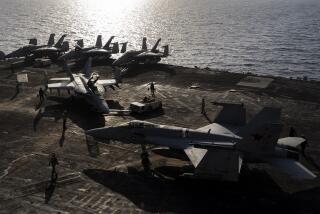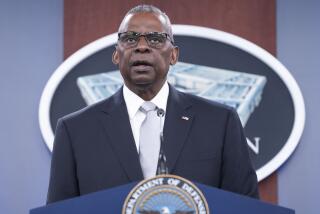Weinberger Outlines Limits of Policy in Gulf : Says U.S. Will Help Any Vessel Under Attack but He Is Ambiguous on Degree of Protection
- Share via
WASHINGTON — Defense Secretary Caspar W. Weinberger, apparently departing from President Reagan’s stated position, outlined limits Friday to the Administration’s commitment to protect shipping in the war-torn Persian Gulf.
The United States, following “practices accepted by all civilized countries,” will come to the aid of ships attacked in the Persian Gulf, whether or not they sail under the American flag, Weinberger told members of the Senate Foreign Relations Committee on Friday.
But he stopped short of promising that vessels that do not fly the Stars and Stripes would enjoy the same protection as the 11 Kuwaiti tankers that have been re-registered under the American flag. In this category he included ships owned by American companies but registered overseas.
“If an American-owned ship reflags itself with another country, the responsibility is not the same,” he said.
Weinberger said vessels owned by U.S. companies but sailing under so-called “flags of convenience” should re-adopt the American flag if they want the Navy’s protection from assault in the Persian Gulf.
About eight American companies own and operate a total of 40 supertankers under foreign flags, mostly Liberian, Panamanian and Bahamian, because operating costs are lower and regulations are less stringent. Several such firms have appealed for American naval protection.
“Our convoys are carefully planned and designed to protect the ships in their embrace,” the defense secretary said. “You can’t just add ships on an ad hoc basis.”
Weinberger’s comments appeared designed to set bounds on the U.S. commitment to protect shipping in the Persian Gulf, which the President cast in the broadest terms during his press conference Thursday evening.
“We’re there to protect neutral-nation shipping in international waters,” Reagan said, suggesting that ships of all nations plying the gulf on peaceful trade missions should be defended.
Favors Boycotting Iran Oil
Weinberger also broke from the apparent Administration consensus in arguing in favor of pressing for a U.N.-sponsored boycott of Iranian oil. Such a worldwide boycott “could dry up very quickly Iran’s capability to conduct the war--and indeed their very existence as a nation,” said Weinberger.
Responding to a question by Sen. Daniel Evans (R-Wash.), Weinberger said the Administration does not aim to “bring Iran to her knees.” But he added, “that would be the effect” of an embargo.
While Weinberger said the proposal “is still under formal consideration,” he conceded that there is broad opposition within the Administration. Opponents argue that trade embargoes are ineffective in influencing the behavior of target countries and that many of Washington’s allies would neither vote for the boycott nor abide by it.
Post Reports Embargo
Meanwhile, the Washington Post reported in today’s editions that the Administration has decided to impose an across-the-board trade ban on Iran.
Citing a senior official, the Post story said that the President is ready to sign an order aimed chiefly at preventing imports of oil from Iran and restricting exports of machinery and other supplies. The ban is “nearly total,” the official said, although some exports of medical supplies will be allowed for “humanitarian reasons.”
“The order imposing the trade ban is on the President’s desk and has been signed off on by all his advisers,” the official said, adding the formal move could come any day.
The Post story said a senior official, who confirmed the pending Administration action, said congressional pressure was an important element in the decision. He said “it was preferable to take such action by executive order” because if would give the Administration “more flexibility” in lifting it if Iran softens its attitude towards the United States and toward U.N. efforts to bring about a cease-fire in the seven-year-old war between Iran and Iraq.
Rejects U.N. Force in Gulf
In his congressional testimony, Weinberger rejected a proposal to replace the U.S. naval force in the Persian Gulf with a U.N. peacekeeping force. Several committee members, including Foreign Relations Committee Chairman Claiborne Pell (D-R.I.), expressed support for a U.N. force.
Weinberger argued that the actions of such a force would be subject to the veto power of the Soviet Union, one of five permanent members of the U.N. Security Council. Citing the participation of several U.S. allies’ navies in patrolling the Persian Gulf, Weinberger said, “We have the benefits of that kind of situation without the burdens.”
Former Secretary of State Cyrus R. Vance and former Defense Secretary Elliot L. Richardson have urged the establishment of a U.N. force, and Sen. Daniel Patrick Moynihan (D-N.Y.) has introduced a resolution calling for the United Nations to register ships plying the gulf peacefully.
More to Read
Sign up for Essential California
The most important California stories and recommendations in your inbox every morning.
You may occasionally receive promotional content from the Los Angeles Times.














